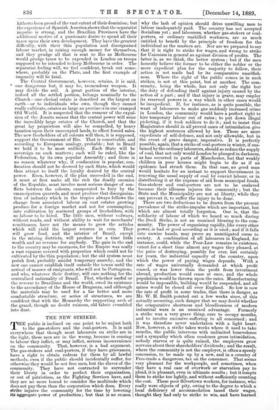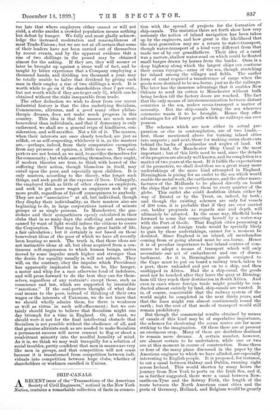otherwise they would be not free men, but the slaves
of the community. They have not contracted to surrender they have a real case of overwork or starvation pay to their liberty in order to perfect their organisation, plead, it is pleasant, even in ultimate results ; but it tempts or out of patriotism, as the Fighting Services have, and them to strike too lightly, and without sufficiently counting they are no more bound to consider the multitude which the cost. These poor Silvertown workers, for instance, who does not pay them than the corporation which does: Every really were objects of pity, owing to the degree to which a strike injures the community for the time by lowering local deficiency of accommodation taxed their wages, its aggregate power of production ; but that is no reason thought they had only to strike to win, and have learned hitherto been proud of the vast extent of their dominion; but why the lash of opinion should drive unwilling men to the experience of Spanish America shows that the separatist labour inadequately paid. The country has not accepted impulse is strong, and the Brazilian Provinces have the Socialism yet ; and labourers, whether gas-stokers or coal- additional motive of a passionate desire to spend all their porters, or ordinary unskilled workmen, are as much taxes upon their own development. They have the greatest entitled to benefit by the principle of freedom for the difficulty, with their thin population and disorganised individual as the masters are. Nor are we prepared to say labour market, in raising enough money for themselves, that it is right to strike for wages, and wrong to strike and they grudge all that is sent to Rio as Melbourne for Unionism in general as against division of profits. The would grudge taxes to be expended in London on troops latter is, as we think, the better system ; but if the men supposed to be intended to keep Melbourne in order. The honestly believe the former to be either the nobler or the separatist feeling will, we feel confident, break out some- more expedient plan for the majority to follow, their where, probably on the Plate, and the first example of action is not made bad by its comparative unselfish- impunity will be fatal. ness. Where the right of the public comes in in such The Central Government, however, retains, it is said, strikes, is not at this point, but at another. The com- change from associated labour on vast estates growing There are two deductions to be drawn from the present produce for a foreign market and not for consumption, prevalence of the strike-impulse which are important, but into cultivation by scattered groups of freeholders, with which are almost totally forgotten. One is, that the no labour to be hired. The little men, without railways, solidarity of labour of which we heard so much during without roads, and without ability to wait for merchants' the Dock Strike, is not an unmixed blessing to the coin- remittances, have not the means to grow the articles munity. The power of organising rapidly, like every other which will yield the largest returns in coin. • They power, is bad or good. according as it is used; and if it falls will grow food, and the interior of Brazil, except into unwise hands, may prove an unmitigated curse to in the mining districts, will produce for a time little society. A combination of all labourers in England, for wealth and no revenue for anybody. The gain in the end instance, could, while the Poor-Law remains in existence, to the country may be enormous, for the Empire was really extort for a short time almost any wages they pleased, at a vast expanse covered with properties which could. not be the price of destroying, possibly for ever, but certainly cultivated by the thin population; but the old system must for years, the industrial capacity of the country, upon perish first, probably amidst temporary anarchy, and the which the power of paying wages depends. With a new one cannot establish itself outside the towns until the rate of wages universally demanded at which profit arrival of masses of emigrants, who will not be Portuguese, ceased, or was lower than the profit from investment and who, whatever their destiny, will care nothing for the abroad, production would. cease at once, and the whole centralised nationality of Brazil. That, whether useful or population would be thrown upon the rates. Manufacturing the reverse to Brazilians and the world, owed its existence would. be impossible, building would be suspended, and all to the ascendancy of the House of Braganza, and although mines would be closed. all over England. So low is now the materials may be used for a far better and more the rate of profit in some trades, that there is danger, as comfortable structure, or series of structures, we are Mr. W. H. Smith pointed out a few weeks since, of this confident that with the Monarchy the supporting arch of actually occurring, such danger that we may doubt whether the grand, though no doubt ruinous, old fabric crumbled the comparative shortness and bloodlessness of modern a strike was a very grave thing, sure to occupy months, THE NEW STRIKES. and to involve excessive suffering to all concerned ; and very pleasant for the workpeople, and sometimes, when too late that where employers either cannot or will not yield, a strike amidst a crowded population means nothing but defeat by hunger. We fully and most gladly acknow- ledge the increased moderation and reasonableness of most Trade-Unions ; but we are not at all certain that some of their leaders have not been carried out of themselves by recent events, and by the apparent evidence that a rise of two shillings in the pound may be obtained almost for the asking. If they are, they will sooner or later be brought up against a stone wall of fact, and be taught by bitter experience that a Company employing a thousand hands, and dividing ten thousand a year, may be totally unable to halve that dividend by giving each man in their employ a rise of two shillings a week. It is worth while to go on if the shareholders clear 7 per cent., but not worth while if they are to get only 31, which can be obtained without the risks inseparable from trade. The other deduction we wish to draw from our recent industrial history is that the idea underlying Socialism, Communism, altruism, and a good many other philan- thropic dreams, does not make much progress in this country. This idea is that the masses are much more benevolent than individuals, and that if democracy is only enthroned, we shall see a general reign of kindliness, con- sideration, and self-sacrifice. Not a bit of it. The masses, when their interests are once clearly touched, are just as selfish, or as self-respecting, whichever it is, as the masters are,—perhaps, indeed, from their comparative exemption from any pressure of opinion, a little more so. The coal- porters are not bound, as we said, to sacrifice themselves for the community ; but while asserting themselves, they ought, if modern theories are true, to think with horror of the suffering their action, though blameless in itself, may entail upon the poor, and especially upon children. It is only masters, according to the theory, who forget such things, and seek profit at the expense of lives. Unhappily, the employed think as little of other classes as employers, and seek to get more wages as employers seek to get more profit, regardless of far-off consequences to anybody. They are not " associative " at all, but individual, though they display their individuality, as their masters also are beginning to do, in large corporations instead of minute groups or as single persons. In Manchester, the gas- stokers and their sympathisers openly calculated in their clubs that in so many days the suffering and annoyance caused by want of light would induce the citizens to coerce the Corporation. That may be, in the great battle of life, a fair calculation ; but it certainly is not based on those benevolent ideas of the poor of which we have all recently been hearing so much. The truth is, that those ideas are not instinctive ideas at all, but ideas acquired from a con- tinuous self-suppression to which human beings, unless Moved by some impulse much higher and stronger than the desire for equality usually is, will not submit. They will, on the contrary, obey the impulse which Providence has apparently implanted in them, to be, like hunger, a motor and whip for a race otherwise fond of indolence, and will press forward to do the best they can for them- selves, regardless of any restraint; except those, such as conscience and law, which are supported by irresistible " sanctions." If the coal-porters thought of what dear coal means to the poor, instead of thinking of their own wages or the interests of Unionism, we do not know that we should wholly admire them, for there is weakness as well as virtue in such self-effacement ; but we cer- tainly should begin to believe that Socialism might one day triumph for a time in England. Or, at least, we should were it not for the final intellectual obstacle that Socialism is not possible without the obedience of all, and that genuine altruists such as are needed to make Socialism a permanent success will never consent to flog or shoot a recalcitrant minority into the needful humility of mind. As it is, we think we may wait tranquilly for a solution of social troubles, pretty confident that men in masses are very like men in groups, and that competition will not cease because it is transformed from competition between indi- viduals into competition between huge clubs, whether of shareholders or workmen enrolled in Unions.











































 Previous page
Previous page